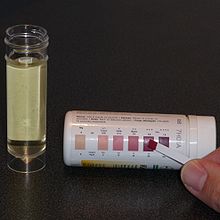
Back نظام غذائي كيتوني Arabic কিটোন-উৎপাদক খাদ্যাভ্যাস Bengali/Bangla Dieta cetogènica Catalan Ketogenní dieta Czech Ketogen Diæt Danish Ketogene Diät German Κετογονική δίαιτα Greek Dieta cetogénica Spanish Ketogeeniline dieet Estonian رژیم غذایی کتوژنیک Persian

The ketogenic diet is a high-fat, adequate-protein, low-carbohydrate dietary therapy that in conventional medicine is used mainly to treat hard-to-control (refractory) epilepsy in children. The diet forces the body to burn fats rather than carbohydrates.
Normally, carbohydrates in food are converted into glucose, which is then transported around the body and is important in fueling brain function. However, if only a little carbohydrate remains in the diet, the liver converts fat into fatty acids and ketone bodies, the latter passing into the brain and replacing glucose as an energy source. An elevated level of ketone bodies in the blood (a state called ketosis) eventually lowers the frequency of epileptic seizures.[1] Around half of children and young people with epilepsy who have tried some form of this diet saw the number of seizures drop by at least half, and the effect persists after discontinuing the diet.[2] Some evidence shows that adults with epilepsy may benefit from the diet and that a less strict regimen, such as a modified Atkins diet, is similarly effective.[1] Side effects may include constipation, high cholesterol, growth slowing, acidosis, and kidney stones.[3]
The original therapeutic diet for paediatric epilepsy provides just enough protein for body growth and repair, and sufficient calories[Note 1] to maintain the correct weight for age and height. The classic therapeutic ketogenic diet was developed for treatment of paediatric epilepsy in the 1920s and was widely used into the next decade, but its popularity waned with the introduction of effective anticonvulsant medications. This classic ketogenic diet contains a 4:1 ketogenic ratio or ratio by weight of fat to combined protein and carbohydrate. This is achieved by excluding high-carbohydrate foods such as starchy fruits and vegetables, bread, pasta, grains, and sugar, while increasing the consumption of foods high in fat such as nuts, cream, and butter.[1] Most dietary fat is made of molecules called long-chain triglycerides (LCTs). However, medium-chain triglycerides (MCTs)—made from fatty acids with shorter carbon chains than LCTs—are more ketogenic. A variant of the classic diet known as the MCT ketogenic diet uses a form of coconut oil, which is rich in MCTs, to provide around half the calories. As less overall fat is needed in this variant of the diet, a greater proportion of carbohydrate and protein can be consumed, allowing a greater variety of food choices.[4][5]
In 1994, Hollywood producer Jim Abrahams, whose son's severe epilepsy was effectively controlled by the diet, created the Charlie Foundation for Ketogenic Therapies to further promote diet therapy. Publicity included an appearance on NBC's Dateline program and ...First Do No Harm (1997), a made-for-television film starring Meryl Streep. The foundation sponsored a research study, the results of which—announced in 1996—marked the beginning of renewed scientific interest in the diet.[1]
Possible therapeutic uses for the ketogenic diet have been studied for many additional neurological disorders, some of which include: Alzheimer's disease, amyotrophic lateral sclerosis, headache, neurotrauma, pain, Parkinson's disease, and sleep disorders.[6]
- ^ a b c d Cite error: The named reference
Freeman2007was invoked but never defined (see the help page). - ^ Cite error: The named reference
MartinMcGill2018was invoked but never defined (see the help page). - ^ Cite error: The named reference
Kossoff2013was invoked but never defined (see the help page). - ^ Cite error: The named reference
Liu2008was invoked but never defined (see the help page). - ^ Cite error: The named reference
Zupec-Kania2008awas invoked but never defined (see the help page). - ^ Cite error: The named reference
Gano2014was invoked but never defined (see the help page).
Cite error: There are <ref group=Note> tags on this page, but the references will not show without a {{reflist|group=Note}} template (see the help page).
© MMXXIII Rich X Search. We shall prevail. All rights reserved. Rich X Search